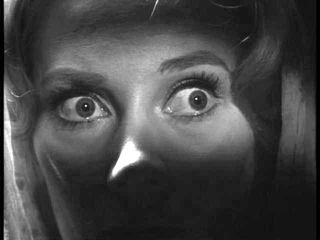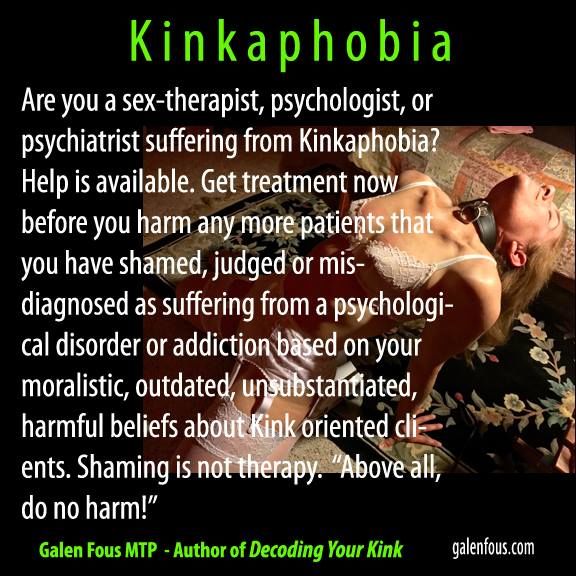Health
Is Kinkphobia a Crisis in the Mental Health Field?
Qualitative studies show that kinkphobia is pervasive in the mental health field
Posted May 24, 2017

Last week, I published an interview with Portland-based psychotherapist Galen Fous on the nature of the unconscious, mythology, and Jungian archetypes as they relate to sexuality and specifically, kink-related expression. While I would consider this piece to be intellectual and certainly highly conceptual in nature, I could not find anything even remotely objectional about it. The piece addressed sexual practices that have been shown to be highly prevalent in society and covered well-worn academic concepts such as classical mythology and Jungian psychology. Indeed, the interview was well received in most circles, except for one—psychotherapists. In fact, the reception in the mental health field was so negative and highly charged it lead to blatant censorship and needless pathologizing. While on the surface it may appear to be a meaningless squabble within professional circles, I thought this incident was especially important to address as it speaks to a lingering and unaddressed potential bigotry which still exists pervasively within the mental health field—kinkphobia.
Before getting into the substance of the issue, let's first address whether kinkphobia is even a word. I know that in today's political climate, sometimes the word "phobia" is thrown around to shut down conversations and prevent open debate, even if it is between reasonable and well-meaning actors. So let's take a look at the evidence to determine whether or not "kinkphobia" is even a "thing." According to Webster's dictionary, the term "phobia" means "an exaggerated. usually inexplicable and illogical fear of a particular object, class of objects, or situation." Further, in 2013 the Diagnostic and Statistical Manual (DSM) 5, the psychiatric handbook, depathologized kink (what they called "paraphilias") and created two categories—paraphilias (which are not pathological) and paraphilic disorders (which are pathological). According to this latest version, paraphilias are consensual and create no internal distress that could otherwise be attributable to societal stigma. Therefore, according to the DSM 5, kinky activity between two consensual adults is not pathological.

If mental health clinicians continue to pathologize kink, even though the DSM has clearly stated it is not abnormal, then according to the dictionary definition, this fear qualifies as both exaggerated and illogical. Using this line of reasoning, mental health professionals who still pathologize kink do qualify as struggling with kinkphobia. With this all in mind, let's take a look at the reaction that Fous' piece garnered, in his words:
"Yesterday I was banned without notice from the Depth Psychology Alliance, a moderated Facebook group for Jungian oriented therapists. I had posted a link to an interview I had done recently titled, “The Personal Erotic Myth and the Rise of Fetishsexuality.” I included this quote with the link.
'When engaged consciously and allowed to express and embody with a consenting partner, these fierce explorations of our taboo, wild instinctual edges can offer a profound sense of empowerment and acceptance, as well as a full-body, soulful, exquisitely spent bliss from either side of the power exchange.'
The group’s moderator accepted the post. Several positive comments were made. The third was an agitated comment from a therapist who stated that Kink is only a pathological expression of “someone incapable of love and intimacy,” and made a reference to how harmful it was to women and relationships when men want that kind of sex.
I replied that her view was outdated and an insult to the millions of men AND women engaging in consensual Kink. I said I felt her views were similar to and as inaccurate as those held by therapists in the 1950’s about homosexuality. She was rather livid that I would dare compare the “courageous struggle of gays and lesbians” to pathologically disturbed people engaging in Kink.
Several more people joined the thread, all favorable to my POV, and some challenging the other therapist over how judgmental she was being. I was getting excited at what I thought would be a very informative discussion about Kink within a professional psychological model I was very much at home in.
I was about to reply to someone’s comment and got notice the post had been removed. I intended to contact the moderator to ask why and discovered that I no longer had access to the group. I had been banned from the group without explanation nor notification.
In response, I started a new thread on my Facebook page titled “Kinkaphobia - Are you a sex-therapist, psychologist, or psychiatrist suffering from Kink-phobia? Help is available. Get treatment now before you harm any more patients that you have shamed, judged or diagnosed as suffering from a psychological disorder or addiction based on your moralistic, outdated, unsubstantiated, harmful beliefs about Kink oriented clients. Shaming is not therapy.”
One of the replies to this thread was from someone in the DPA group who disclosed that right after my post was taken down, a new rule about posting was created.
'Any content determined to be inappropriate, in poor taste, or otherwise contrary to the purposes of the forum will be deleted and the poster risks being removed from the group.'
She commented further, “The article you posted was totally relevant to Depth Psychology. If an equivalent article regarding working with gay clients were posted and a commenter said 'Homosexuality is only a pathological expression of someone incapable of love and intimacy" - we would never accept that as a reason to delete a post. I am pretty pissed about this.'
I am too. And I hope this begins a wake-up call within the various academic, clinical and alternative therapeutic communities to become educated about Kink oriented sexuality and stop shaming and pathologizing client’s seeking to come to terms with their sexual truth."

Without going further into the politics of this particular group, I think it is important to note that dozens of other individuals stepped forward in Fous' Facebook thread to state that they too have been pathologized and discriminated against, both as colleagues and as patients, by kinkphobic mental health professionals. Based on my research, their experiences are not unique. Indeed a 2008 survey of kinksters by the National Coalition of Sexual Freedom (NCSF) found that 39.3% of total respondents (346) were discriminated against by mental health practitioners. Here were some of the comments:
- "The therapist refused to continue to see me until I acknowledge that I was being 'Abused'."
- "I was told by a licensed psychologist that I was a sick individual and that if I did not get help immediately, and change the way I lived, that I would never have a productive life, and that I would never find any happiness. By fitting into the 'norm' I would be a more socially 'productive' person, and I would be able to live a 'normal' life."
- "Mental Health Professional said I was psychologically unsound. That no one in their right mind would consent to 'those types' of activities."
- "I have been told that I am not a suitable patient by a Licensed Clinical Social Worker who was being contacted for therapy services. She believed that my sexual practices were contrary to health and she would not provide me therapy if I chose to practice."
I believe these responses are outrageous, particularly in light of the guidelines established by the American Psychiatric Association (APA) within its DSM 5 handbook. If the general population is more open-minded than mental health professionals, what does that say about the field? Further, how can any kinky individuals get any decent help if they are continuously confronted by discrimination by kinkphobic mental health practitioners? It's time to finally shine a light on ignorance and bigotry within the mental health field. While it has finally come to generally accept homosexuality as a legitimate orientation and lifestyle, it still lags far behind in properly understanding and providing accurate and humane treatment to kink-identified individuals. Which leads me to my initial question—is kinkphobia a crisis in the mental health field? And if so, what do we do about it?


